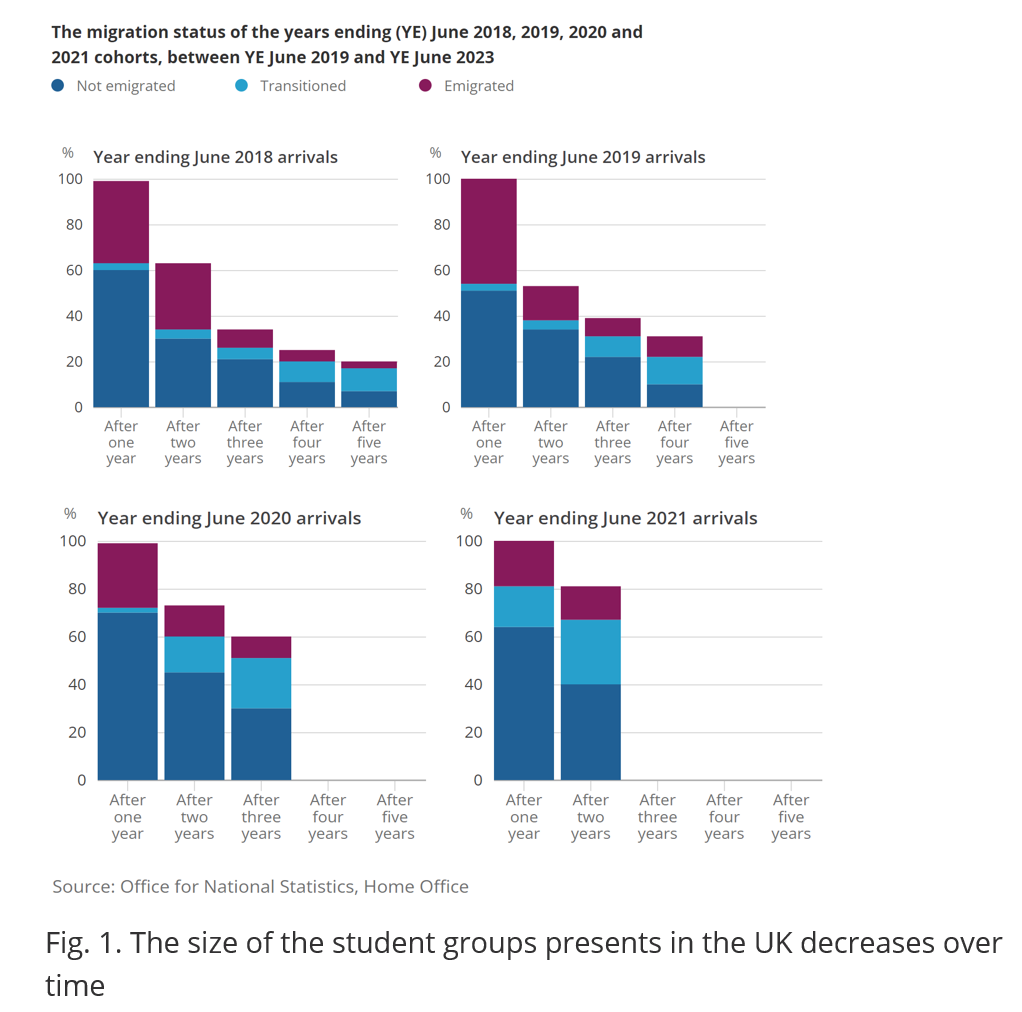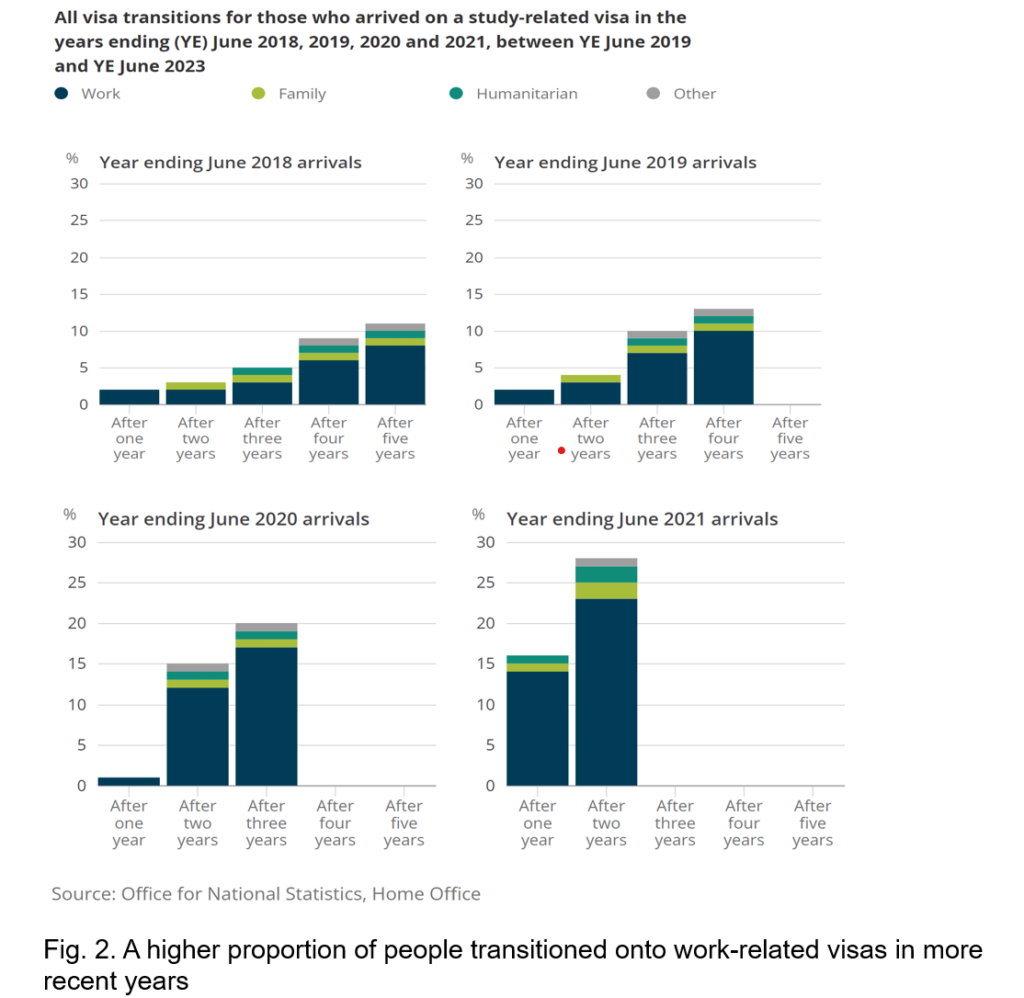Executive Summary
The Home Office’s recent proposal to limit international students to study in the UK has ignited substantial debate. This article analyses the potential consequences on the higher education sector, anticipating a decrease in international student numbers, a potential dip in educational quality, and financial setbacks for universities. It also explores the broader implications on the UK’s economy and international relations as a result of the recent policy. Turning our focus to the broader question, the United Kingdom is undeniably one of the most sought-after destinations for international students, boasting several compelling reasons that position it as a top choice. However, considering the recent policy changes, it prompts us to ponder whether the UK remains the ideal destination for international students. What are your thoughts on this?
Table of Contents
Toggle- Why is the UK considered an ideal destination for international students?
- Office of National Statistics(ONS) Record
- Challenges that international students face in the UK
- Benefits that international students bring to the UK
- Recent changes on visa policy for international students
- Home Secretary James Cleverly said:
- The outcome of the recent change in policy by the Home Office
- Conclusion
Why is the UK considered an ideal destination for international students?
· First off, the UK is home to high-class institutions that provide both theoretical and practical knowledge, making students job-competent. The country offers abundant job opportunities, attracting significant number of international students coming to study in the UK every year.
· The United Kingdom stands out as a premier choice for international students owing to its globally acclaimed education system. Degrees obtained from UK universities carry significant prestige among employers. Furthermore, the shorter duration of courses contributes to a more cost-effective study experience compared to other nations.
· The UK’s multicultural community is another big draw, as it’s open to new traditions and cultures, providing a diverse and welcoming environment for students from all over the world.
· In terms of work permits, the UK has been a popular choice for international students due to the post-study work opportunities it offers.
· When it comes to the study environment, the UK has 15 cities that rank among the top 100 student-friendly cities in the world, offering excellent academic opportunities, cultural attractions, and a good standard of living.
· The quality of education in the UK is highly regarded, with three of the top ten universities in the world located in the UK.
· Additionally, the recent introduction of the graduate route allows international students to stay and work in the UK for two years after completing their studies, providing valuable work experience.
Office of National Statistics(ONS) Record
· According to ONS, for the period ending June 2023, the net migration of international students who originally came to the UK on study-related visas totalled 263,000, inclusive of those who switched to different visa types during their time in the country.
· On average basis, ONS research indicates that newer groups of students tend to prolong their stay in the UK. In the academic year spanning from September 1, 2021, to August 31, 2022, 35% of students had permanently relocated by the conclusion of their initial study visa, in contrast to 61% for the academic cohort year of 2019 to 2020.
Challenges that international students face in the UK

· Culture difference is a common experience that international student face in the UK, causing feelings of disorientation due to an unfamiliar way of life. To cope, explore student groups, stay open-minded, and consider support services provided by the respective institutions.
· Financial difficulties. For financial difficulties, students can approach through Student Services of respective institutions to seek assistance on funding support.
· Language difficulties may arise for non-English speakers. Practice with friends and listen to English media to enhance communication skills.
· Finding accommodation can be a significant concern for many students. It’s essential for international students to be aware of their rights and to receive support in finding suitable accommodation.
Benefits that international students bring to the UK
· Economic Contribution: International students in the UK contribute significantly to the economy, with recent statistics indicating a contribution of more than £25.9 billion each year. This contribution is vital for various sectors and the overall economic well-being of the country.
· Opportunities for Employment: Upon finishing their studies, international students frequently seek employment in the UK, actively participating in the workforce and addressing crucial skill shortages across diverse industries.
· Cultural Variety. The inclusion of international students enhances the cultural diversity of the UK. Which as a result, fosters a more dynamic and inclusive atmosphere within both universities and the wider community.
Recent changes on visa policy for international students
Limitations on Dependent Accompaniment. The revised policy curtails the capacity of international students to bring their dependents along when coming to the UK. This has also prompted concerns regarding the potential consequences on the welfare and support networks for these students.
Taking into account the current public sentiments, possibly influenced by the impending election, the UK government is actively working to decrease net immigration, and this effort extends to international students. The measures introduced for international students are outlined below:
1. Removing the right for international students to bring dependants unless they are on postgraduate courses currently designated as research programmes.
2. Removing the ability for international students to switch out of the student route into work routes before their studies have been completed.
3. Reviewing the maintenance requirements for students and dependants.
4. Steps to clamp down on unscrupulous education agents who may be supporting inappropriate applications to sell immigration not education.
5. Better communicating immigration rules to the higher education sector and to international students.
6. Improved and more targeted enforcement activity.
These new restrictions came into effect on 1st January of 2024.
Top of Form
Recent decision to implement stricter visa requirements for international students has sparked intense debate and raised concerns about its impact.
The changes, which came into effect on January 1, 2024, restrict most international students from bringing family members to the UK, with exceptions for postgraduate research courses and courses with government-funded scholarships.
The government aims to reduce net migration by an estimated 140,000 people. It mainly focus on curbing abuse of the immigration system and bringing migration down to sustainable levels. Meanwhile ensures those affected have ample time to prepare for upcoming changes.
Home Secretary James Cleverly said:
“This government is delivering on its commitment to the British public to cut migration. We have set out a tough plan to rapidly bring numbers down, control our borders and prevent people from manipulating our immigration system, which will come into force throughout this year.”
“Yesterday, a major part of that plan came into effect, ending the unreasonable practice of overseas students bringing their family members to the UK. This will see migration falling rapidly by the tens of thousands and contribute to our overall strategy to prevent 300,000 people from coming to the UK.”


Related articles:
Is Al Jazeera a reliable news source?
The looting machine
The outcome of the recent change in policy by the Home Office
· The impact of these changes on international students is significant. The restriction on bringing dependents may influence the decisions of students considering studying in the UK. Which could potentially affect the overall appeal of the UK as a study destination.
· Additionally, the changes may contribute to a decline in the recruitment of international students. Which could potentially impact the UK’s higher education economy and international relations.
· International students are a significant source of revenue for UK universities, with pounds being added to the economy annually.
· Limiting the number of international students in the UK higher education sector will cause severe problems for universities and local economies.
· This plan could jeopardise the UK’s leading higher education and research reputation.
While the government remains committed to the International Education Strategy and recognizes the important benefits that international students bring to the UK, including their economic contribution, the policy changes reflect a tough but fair approach to reduce net migration to sustainable levels.
Government plans to work with universities to design an approach that balances the commitment to lower overall levels of migration. Meanwhile this ensures that only highly skilled and provide the most benefit to the economy.
In the coming months, the government will closely monitor the impact of these changes. The focus on reducing net migration and curbing abuse of the immigration system is a central part of its strategy. Which follows additional measures to bring legal migration down to sustainable levels. These measures aim to ensure that those affected have ample time to prepare for upcoming changes throughout early 2024.
Conclusion
In conclusion, recent changes to the UK’s student visa policy pose challenges and risks for international postgraduate students. Consequently prompting a close monitoring of their impact on the higher education economy and international relations. The government’s ongoing collaboration with universities aims to devise an alternative approach that aligns with the commitment to reduce overall migration while ensuring newcomers contribute significantly to the economy. Despite these challenges, the UK remains an attractive destination for international students, offering high-quality education and job prospects. Nevertheless, prospective students should be mindful of potential hurdles like accommodation issues and seek adequate support to optimize their experience studying in the UK.
Information in this article is sourced from entities like UKCISA, HEPI, and industry professionals in international education. Make independent verification from official and up-to-date sources before deciding, to ensure accuracy.











3 responses